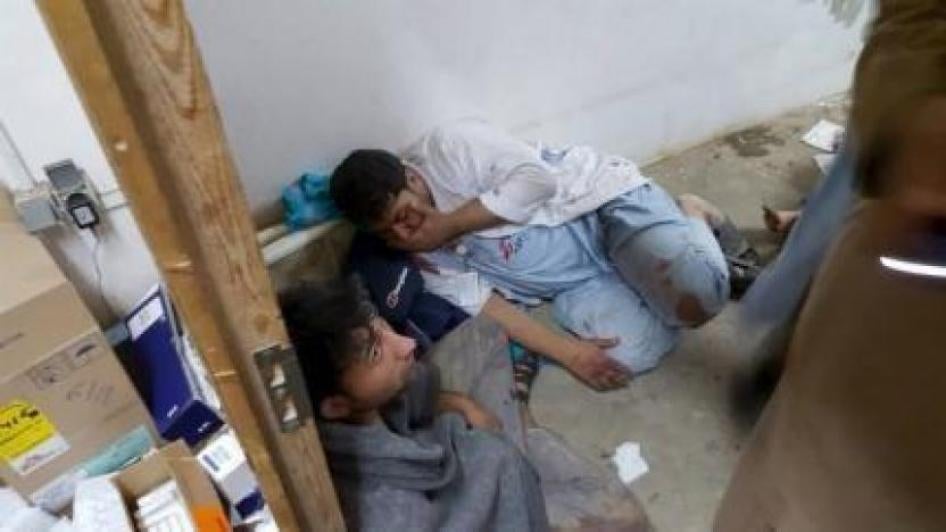(New York) – US airstrikes hit a Medecins Sans Frontieres (MSF) hospital in Kunduz, Afghanistan, raising grave concerns about whether US forces took sufficient precautions to identify and avoid striking the facility, Human Rights Watch said today.
The hospital was hit several times in the early morning of October 3, 2015, during sustained bombing that was apparently aimed at insurgent forces in the vicinity. At least 9 medical staff were killed and 37 critically injured. The hospital was treating 105 patients at the time of the attack.
“The bombing of the hospital is a shocking development for Kunduz, where civilians and aid workers are already at grave risk from the fighting,” said Patricia Gossman, senior Afghanistan researcher at Human Rights Watch. “All forces are obligated to do their utmost to avoid causing civilian harm.”
Afghan police in Kunduz have asserted that Taliban fighters were firing from the hospital. If that were in fact the case, it would have been an unlawful use of the hospital by Taliban forces. However, given the hospital's protected status and the large numbers of civilians and medical personnel in the facility, attacking the hospital would still likely have been an unlawfully disproportionate attack, causing greater harm to civilians and civilian structures than any immediate military gain. In addition, the laws of war require that even if military forces misuse a hospital to deploy able-bodied combatants or weapons, the attacking force must issue a warning to cease this misuse, setting a reasonable time limit for it to end, and attacking only after such a warning has gone unheeded.
The location of the MSF medical facility had been communicated to all parties, including US forces, months before the present fighting in Kunduz began. According to MSF the bombing continued for 30 minutes after US and Afghan military officials in Kabul and Washington had been informed of the first attack’s proximity to the hospital. The failure of US forces to stop an attack striking a hospital strongly suggests the forces may have violated the laws of war in identifying risks to civilians and civilian objects and in the weapons used or conduct of the military operation.
Human Rights Watch called for an impartial, thorough and transparent investigation into the incident to establish the circumstances of the attack, and urged the US to review its targeting procedures to ensure such incidents do not reoccur.
A spokesman for US forces in Afghanistan, Col. Brian Tribus stated that “individuals threatening the force” were the target of the strike that took place at 2:15 a.m., and that the strike “may have resulted in collateral damage to a nearby medical facility.” He said that the incident was under investigation.
International humanitarian law, or the laws of war, applies to all sides in the fighting in Afghanistan. The laws of war require that the parties to a conflict take constant care during military operations to spare the civilian population and to “take all feasible precautions” to avoid or minimize the incidental loss of civilian life and damage to civilian objects. Hospitals have special protections under the laws of war such that parties need to take additional precautions to avoid subjecting them to the risk of attack.
The MSF hospital is the only facility of its kind in northeast Afghanistan. Since fighting broke out in Kunduz on September 27, its staff had treated nearly 400 wounded, most of them civilians with gunshot injuries.
Human Rights Watch conveyed its heartfelt condolences to the families and loved ones of the hospital workers killed in the attack. “Our thoughts are with the families and loved ones of the MSF colleagues who lost their lives trying to help others in Afghanistan,” said Gossman.






